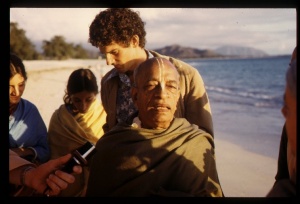SB 10.45.34

A.C. Bhaktivedanta Swami Prabhupada
TEXT 34
sa-rahasyaṁ dhanur-vedaṁ
dharmān nyāya-pathāṁs tathā
tathā cānvīkṣikīṁ vidyāṁ
rāja-nītiṁ ca ṣaḍ-vidhām
SYNONYMS
sa-rahasyam—along with its confidential portion; dhanuḥ-vedam—the science of military weapons; dharmān—the doctrines of human law; nyāya—of logic; pathān—the methods; tathā—also; tathā ca—and similarly; ānsīkṣikīm—of philosophical debate; vidyām—the branch of knowledge; rāja-nītim—political science; ca—and; ṣaṭ-vidhām—in six aspects.
TRANSLATION
He also taught Them the Dhanur-veda, with its most confidential secrets; the standard books of law; the methods of logical reasoning and philosophical debate; and the sixfold science of politics.
PURPORT
Śrīla Śrīdhara Svāmī explains that the confidential portion of the Dhanur-veda, military science, includes knowledge of the appropriate mantras and presiding deities of warfare. Dharmān refers to the Manu-saṁhitā and other standard lawbooks (dharma-śāstras). Nyāya-pathān refers to the doctrine of Karma-mīmāṁsā and other such theories. Ānvīkṣikīm is knowledge of the techniques of logical argument (tarka). The sixfold political science is quite pragmatic and includes (1) sandhi, making peace; (2) vigraha, war; (3) yāna, marching; (4) āsana, sitting tight; (5) dvaidha, dividing one's forces; and (6) saṁśaya, seeking the protection of a more powerful ruler.